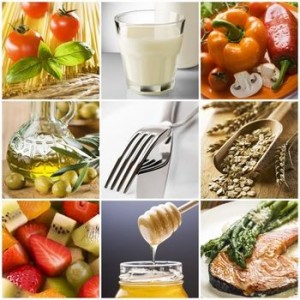Vitamin B, like C, is water soluble, that means they are dissolved in water. Storage thereof in the body is minimal, making it necessary to ingest in our daily diet.
Too much of this vitamin is excreted in the urine (mostly). This guide will help you know what foods and what is the function of each type of vitamin B.
Vitamin B1
- It promotes the proper functioning of the nervous system.
- Growth and maintenance of the skin.
- Help states of depression, irritability, memory loss and exhaustion.
A shortage of vitamin B1 in the body gives rise to poor overall mood, cardiovascular disorders and poor performance. Vitamin B1 can be found in meat, egg yolk, wheat germ, peanuts, oats, cod roe, pulses, cereals and whole grains and nuts. An excessive amount of this vitamin can affect the thyroid.
Vitamin B2
- Performs a oxygenating activity.
- Involved in the skin, nails, hair and mucous membranes.
- Help the ocular system and relieves eye strain.
The shortage of this vitamin in the body can cause sore throat, anemia, swelling at the corners of the mouth and dermatitis.
The food in which we can find the vitamin B2 are the first and foremost, the liver, milk, cheese, eggs, cereals, meat, lentils, mushrooms, coconut, green vegetables (spinach, chard, etc..) oats and legumes.
Vitamin B3
- Involved in the bloodstream.
- Promotes growth.
- Help the proper functioning of the respiratory system.
- It helps the digestive system and its operation.
- Necessary for the health of the brain and nervous system.
Deficiency of this vitamin can cause dermatitis, stomach pains, fatigue, dementia and depression.
Vitamin B3 can be found in meats, liver, kidney, fish, melon, milk, peach apricot, egg, red pepper, green leafy vegetables, whole wheat, brown rice, nuts and legumes.
Vitamin B5
- Helps convert fats into sugars.
- Encourages the development of the nervous system.
- It helps wound healing.
- Prevents fatigue.
- Participates in the synthesis of red blood cells.
The shortage of this vitamin causes disorders in the skin and blood, allergies and tiredness.
Foods that contain this vitamin are all vegetables and meats, especially liver, fruits and nuts.
Vitamin B6
- Formation of red blood cells.
- Helps balance of sodium and potassium.
- Promotes growth.
- Prevents diseases of the nervous system and skin.
The shortage of this vitamin causes depression, nervous, weakness and skin problems.
Vitamin B6 can be found in the egg (yolk), liver, kidney, fish, dairy, meat, chicken, oats, avocado, potatoes and dried fruit.
Vitamin B8
- Involved in the metabolism of fats and proteins.
- Relieves muscle aches.
- Help in the presence of dermatitis or eczema.
The shortage of this vitamin causes fatigue, depression and nausea. The food present this vitamin are liver, beans, eggs (yolk), cauliflower and walnuts.
Vitamin B9
Vitamin B9 also known as folic acid.
- It promotes the formation of red blood cells.
- Prevents anemia.
- Maintains healthy skin.
The shortage of this food may cause digestive problems; anemia and pregnant women can cause birth defects in the neural tube baby.
Foods that contain vitamin B9 or folic acid are all kinds of meats, liver, cereals, spinach, asparagus, spinach, mushrooms, oranges, nuts, egg (yolk) and potatoes.
Vitamin B12
- Processing cells.
- Formation of red blood cells.
- It promotes the proper functioning of the nervous system.
The shortage of this vitamin leads to anemia, fatigue and pronounced pallor. It is present in foods of animal origin (meat and dairy).
Vitamin B13
- Metabolized folic acid and vitamin B12.
- Helps the treatment of multiple sclerosis.
- Prevents liver problems.
It is mainly found in the edible roots.
Vitamin B15
- Antioxidant and protects cells.
- Facilitates the absorption of oxygen in the tissues.
- Supports the immune system.
- Relieves symptoms of angina and asthma.
A lack of vitamin B15 in the body produces a glandular disorder and nervous level, possible heart disease and decreased oxygen in the tissues.
We can find it in the sesame seeds in the pumpkin and whole grains.
